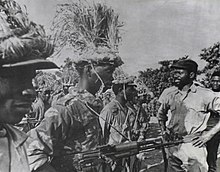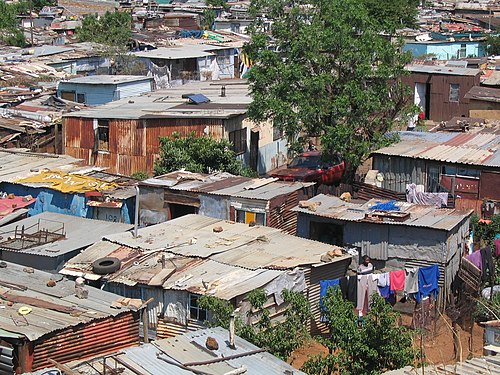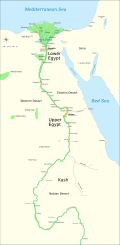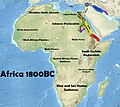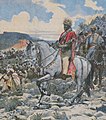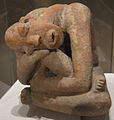


Africa is the world's second largest and second-most populous continent after Asia. At about 30.3 million km2 (11.7 million square miles) including adjacent islands, it covers 20% of Earth's land area and 6% of its total surface area. With 1.4 billion people0 as of 2021, it accounts for about 18% of the world's human population. Africa's population is the youngest amongst all the continents; the median age in 2012 was 19.7, when the worldwide median age was 30.4. Despite a wide range of natural resources, Africa is the least wealthy continent per capita and second-least wealthy by total wealth, ahead of Oceania. Scholars have attributed this to different factors including geography, climate, tribalism, lack of democracy, corruption, colonialism, the Cold War, and neocolonialism. Despite this low concentration of wealth, recent economic expansion and the large and young population make Africa an important economic market in the broader global context.
Africa straddles the equator and the prime meridian. It is the only continent to stretch from the northern temperate to the southern temperate zones. The majority of the continent and its countries are in the Northern Hemisphere, with a substantial portion and a number of countries in the Southern Hemisphere. Most of the continent lies in the tropics, except for a large part of Western Sahara, Algeria, Libya and Egypt, the northern tip of Mauritania, and the entire territories of Morocco, Ceuta, Melilla, and Tunisia which in turn are located above the tropic of Cancer, in the northern temperate zone. In the other extreme of the continent, southern Namibia, southern Botswana, great parts of South Africa, the entire territories of Lesotho and Eswatini and the southern tips of Mozambique and Madagascar are located below the tropic of Capricorn, in the southern temperate zone.
Africa is highly biodiverse; it is the continent with the largest number of megafauna species, as it was least affected by the extinction of the Pleistocene megafauna. However, Africa also is heavily affected by a wide range of environmental issues, including desertification, deforestation, water scarcity and pollution. These entrenched environmental concerns are expected to worsen as climate change impacts Africa. The UN Intergovernmental Panel on Climate Change has identified Africa as the continent most vulnerable to climate change.
The history of Africa is long, complex, and varied, and has often been under-appreciated by the global historical community. Africa, particularly Eastern Africa, is widely accepted as the place of origin of humans and the Hominidae clade (great apes). The earliest hominids and their ancestors have been dated to around 7 million years ago, including Sahelanthropus tchadensis, Australopithecus africanus, A. afarensis, Homo erectus, H. habilis and H. ergaster—the earliest Homo sapiens (modern human) remains, found in Ethiopia, South Africa, and Morocco, date to circa 233,000, 259,000, and 300,000 years ago, respectively, and Homo sapiens is believed to have originated in Africa around 350,000–260,000 years ago. Africa is also considered by anthropologists to be the most genetically diverse continent as a result of being the longest inhabited. (Full article...)
Selected article –
The Mozambican War of Independence was an armed conflict between the guerrilla forces of the Mozambique Liberation Front or FRELIMO (Frente de Libertação de Moçambique) and Portugal. The war officially started on September 25, 1964, and ended with a ceasefire on September 8, 1974, resulting in a negotiated independence in 1975.
Portugal's wars against guerrilla fighters seeking independence in its 400-year-old African territories began in 1961 with Angola. In Mozambique, the conflict erupted in 1964 as a result of unrest and frustration amongst many indigenous Mozambican populations, who perceived foreign rule as exploitation and mistreatment, which served only to further Portuguese economic interests in the region. Many Mozambicans also resented Portugal's policies towards indigenous people, which resulted in discrimination and limited access to Portuguese-style education and skilled employment. (Full article...)Featured pictures –
Did you know (auto-generated) -

- ... that economist and anti-apartheid activist Vella Pillay arranged for South African revolutionaries to receive military training in the Soviet Union and China?
- ... that the first successful Mars rover, Sojourner, was named after the Civil War era African-American abolitionist and women's rights advocate Sojourner Truth?
- ... that the book Love Falls On Us, about the LGBTQ movement in Africa, was praised by author Uzodinma Iweala for "elevating the extraordinary ordinariness of L.G.B.T.Q. Africans"?
- ... that a former member of the French Senate ended up being exiled to the northern Central African Republic by the future emperor?
- ... that the 51st Defense Battalion, formed during World War II, was the first African-American unit in the United States Marine Corps?
- ... that The Red Moon was the first Broadway show to depict alliances between African Americans and Native Americans?
Categories
Selected biography –
Lupita Amondi Nyong'o (US: /luːˈpiːtə ˈnjɔːŋoʊ/ loo-PEE-tə NYAWNG-oh, Swahili: [luˈpitɑ ˈɲɔŋɔ] ⓘ, Spanish: [luˈpita ˈɲoŋɡo]; born 1 March 1983) is a Kenyan-Mexican actress. She is the recipient of several accolades, including an Academy Award, and a Daytime Emmy Award with nominations for a Tony Award and a Golden Globe Award.
The daughter of Kenyan politician Peter Anyang' Nyong'o, she was born in Mexico City, where her father was teaching, and was raised in Kenya from the age of three. She attended college in the United States, earning a bachelor's degree in film and theatre studies from Hampshire College. She later began her career in Hollywood as a production assistant. In 2008, she made her acting debut with the short film East River and subsequently returned to Kenya to star in the television series Shuga (2009–2012). She then pursued a master's degree in acting from the Yale School of Drama. Soon after her graduation, she had her first feature film role as Patsey in Steve McQueen's biopic 12 Years a Slave (2013), for which she received critical acclaim and won the Academy Award for Best Supporting Actress. (Full article...)Selected country –
 |
 |
|

| ||
The Central African Republic (CAR, French: République Centrafricaine IPA: /ʀepyblik sɑ̃tʀafʀikɛn/ or Centrafrique /sɑ̃tʀafʀik/) is a landlocked country in Central Africa. It borders Chad in the north, Sudan in the east, the Republic of the Congo and the Democratic Republic of the Congo in the south, and Cameroon in the west. Most of the CAR consists of Sudano-Guinean savannas but it also includes a Sahelo-Sudanese zone in the north and an equatorial forest zone in the south.
Since most of the territory is located in the Ubangi and Shari river basins, the French called the colony it carved out in this region Ubangi-Shari, or Oubangui-Chari in French. The colony became a semi-autonomous territory of the French Community in 1958 and then an independent nation on 13 August 1960. The first fair democratic elections, held in 1993, brought Ange-Félix Patassé to power. Patassé was overthrown by French-backed General François Bozizé in 2003, who won a democratic election in May 2005 and remains in power today. (Read more...)
Selected city –

In the news
- 12 February 2024 –
- Two boats collide on the Congo River near Kinshasa, Democratic Republic of the Congo; with the death toll remains unclear. (AP)
- 11 February 2024 – 2023 Africa Cup of Nations
- In association football, hosts Ivory Coast win their third Africa Cup of Nations by defeating Nigeria 2–1 in the final. Sébastien Haller scores the winning goal in the 81st minute. (The Guardian)
- 10 February 2024 – Somali civil war
- Four Emirati soldiers and a Bahraini military officer are killed, while ten other people are injured, when a soldier opens fire at a military base in Mogadishu, Somalia, before being killed in the ensuing shootout. Al-Shabaab claims responsibility. (AP)
- 10 February 2024 –
- A Eurocopter EC130 helicopter crashes near Nipton, California, United States, killing all the six people on board, including Nigerian banker Herbert Wigwe. (CBS News)
- 10 February 2024 – 2023–2024 Senegalese protests
- Violent protests occur in Senegal following an announcement by President Macky Sall that presidential elections have been delayed from February 25 to December 15. (Sky News)
- 9 February 2024 –
- At least 18 people are killed during a collision between a bus and a truck on a road in Kinshasa, Democratic Republic of the Congo. (AP)
Updated: 16:33, 14 February 2024
General images -
Africa topics
More did you know –

- ...that the 1459 Fra Mauro map (pictured) reports that "a junk from India" rounded the Cape of Good Hope in 1420, around 70 years before the navigations of Vasco da Gama?
- ...that the 1998 Sudan famine was caused by human rights abuses in the midst of the Second Sudanese Civil War?
- ...that a smokie is a West African delicacy made by blowtorching the carcass of a sheep or goat without removing its fleece?
- ...that Anne-Marie Nzié, a Cameroonian bikutsi singer, dedicated the song Liberté to President Paul Biya and his party, the Cameroon People's Democratic Movement?
Related portals
Major Religions in Africa
North Africa
West Africa
Central Africa
East Africa
Southern Africa
Associated Wikimedia
The following Wikimedia Foundation sister projects provide more on this subject:
-
Commons
Free media repository -
Wikibooks
Free textbooks and manuals -
Wikidata
Free knowledge base -
Wikinews
Free-content news -
Wikiquote
Collection of quotations -
Wikisource
Free-content library -
Wikispecies
Directory of species -
Wikiversity
Free learning tools -
Wikivoyage
Free travel guide -
Wiktionary
Dictionary and thesaurus
